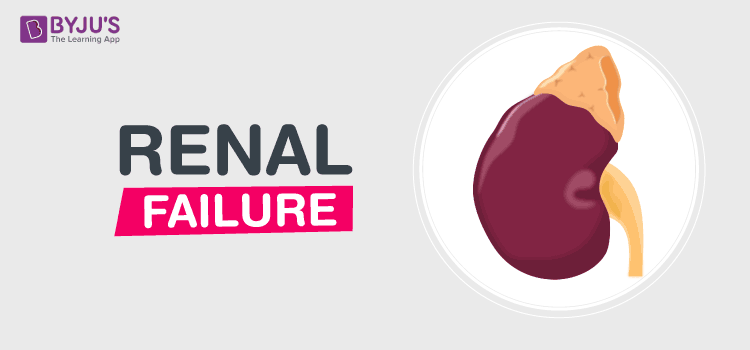Table of Contents
- What is Renal Failure?
- Causes of Renal Failure
- Types of Renal Failure
- Symptoms of Renal Failure
- Prevention and Treatment of Renal Failure
What is Renal Failure?
“Renal failure or kidney failure is the condition when the kidneys do not function properly. “

The kidneys filter the blood and remove toxins from it. These toxins are passed to the bladder where they are removed during micturition. When the kidneys fail to remove toxic substances from the body, this is known as renal failure.
Let us have an overview of renal failure, its causes, types and symptoms.
Causes of Renal Failure
In usual scenarios, renal/kidney failure is caused due to certain infections-related illness. There would be no symptoms shown by the patients having an intrinsic renal disease or low-grade chronic obstruction. A person suffering from diabetes mellitus or with high blood pressure is more prone to renal failure.
Renal failure might be caused due to a number of factors:
- Certain acute and chronic diseases
- Excessive dehydration
- Kidney trauma
- Exposure to pollutants or excessive medicines
Also Read: Kidney Function Test
Types of Renal Failure
Renal failure is of two types:
- Acute Renal Failure or ARF
- Chronic Renal Failure or CRF
Acute Renal Failure
Acute renal failure occurs when the kidney suddenly stops filtering blood.
The major symptoms of acute renal failure include:
- internal bleeding
- confusion
- swelling of hands, face and feet
- high blood pressure
- seizures
Types of Acute Renal Failure
Acute renal failure is divided into three main categories:
- Prerenal acute kidney injury
- Intrinsic acute renal injury.
- Post-renal Intrinsic renal injury.
Prerenal Acute Kidney Injury
A pre-renal failure is caused mainly by the reduction in the blood flow to the kidney. It is not due to the direct damage of the nephron itself. Other factors resulting in pre-renal failure are:
- Gastroenteritis, or loss of blood
- Vasodilation caused by the drug’s reaction
- Active hypovolemia sepsis
- Decreased cardiac output
- Anaphylaxis
- Addisonian crisis
- Salt wasting syndrome
- Protein-losing enteropathy
- Altered hemodynamics or dynamics of blood flow caused by dehydration
- Deficiency of blood in kidneys by– Intrarenal redistribution, mainly caused by, vasoconstrictors, anaesthesia, stress and surgery
Intrinsic Acute Renal Injury
The intrinsic renal injury is characterized by direct damage to the nephrons. It is often complex and may be secondary to another illness. Prerenal factors noted above may lead to acute tubular necrosis (ATN). Additional causes include
- Glomerulonephritis (acute post-streptococcal and others)
- Microangiopathic states (hemolytic uremic syndrome, DIC, TTP)
- Vasculitis (polyarteritis nodosa, Lupus, Wegener’s granulomatosis)
Post-renal Intrinsic Renal Injury
The post-renal injury is caused by a blockage to the flow of urine, resulting in back pressure to the kidney, which causes damage to
- Nephrons.
- Posterior urethral valves.
- Urethral strictures – narrowing of the urethra
- Bladder obstruction from clots (hemorrhagic cystitis),
- Formation of ureteral stones.
Chronic Renal Failure
The patient with chronic renal failure does not show any symptoms until the kidney function declines to 20%. It exhibits certain signs and symptoms:
- high blood pressure
- nausea
- vomiting
- seizures
- chest pain
- shortness of breath
- itching
- fatigue
- headache
Symptoms of Renal Failure
As mentioned above, patients having Renal failure or kidney failure symptoms would not show any symptoms in the early stages. The symptoms usually develop slowly or may not appear until both the kidneys are badly damaged by the accumulation of more wastes and extra fluid building up in the body. The common symptoms include:
- Fever
- Rashes
- Diarrhoea
- Insomnia
- Vomiting
- Muscle cramps
- Frequent urine
- Loss of Appetite
- Nausea and vomiting
- Trouble in breathing
- Abdominal and back pain
- Swelling of both feet and ankles
Prevention and Treatment of Renal Failure
As per the outcome of established renal /kidney failure, prevention is critical. In certain cases, the risk of developing renal failure could be predicted such as decreased perfusion secondary to abdominal surgery, coronary bypass surgery, acute blood loss in trauma, and uric acid nephropathy, where preventative strategies could prove effective.
When patients with risk factors for developing renal failure are scheduled for surgery, the doctor should be aware that the likelihood of the patient developing renal failure is high and should consider preventative measures, including discontinuation of medications that might enhance the likelihood of renal damage (e.g., NSAIDs, angiotensin-converting enzyme inhibitors).
Preventive Dialysis
A novel approach to reduce the incidence of nephrotoxicity is associated with radiocontrast dye administration. It is provided prophylactically to patients who are at high risk of acute renal failure.
Hemofiltration initiated prior to and continued for 24 hours after dye administration has resulted in a significant reduction in mortality and a reduced need for dialysis.
Dopamine and Diuretics
Given the dismal outcome of established acute renal failure, many drugs have been investigated for its prevention. Almost all of these approaches have been shown to be of little to no value. Low doses of dopamine (≤ 2 mcg/kg/min) increases renal blood flow and might be expected to increase GFR (glomerular filtration rate). Theoretically, this could be considered beneficial, as an enhanced GFR (glomerular filtration rate) might flush nephrotoxins from the tubules, minimizing their toxicity.
Also Read: Urine Formation and Osmoregulation
For more additional information about renal failure, its causes, symptoms and treatment, keep visiting BYJU’S website. You can also refer to the links below.
| Human Excretory System | Regulation Of Kidney Function |
| Dialysis | Disorders Of The Excretory System |

Comments